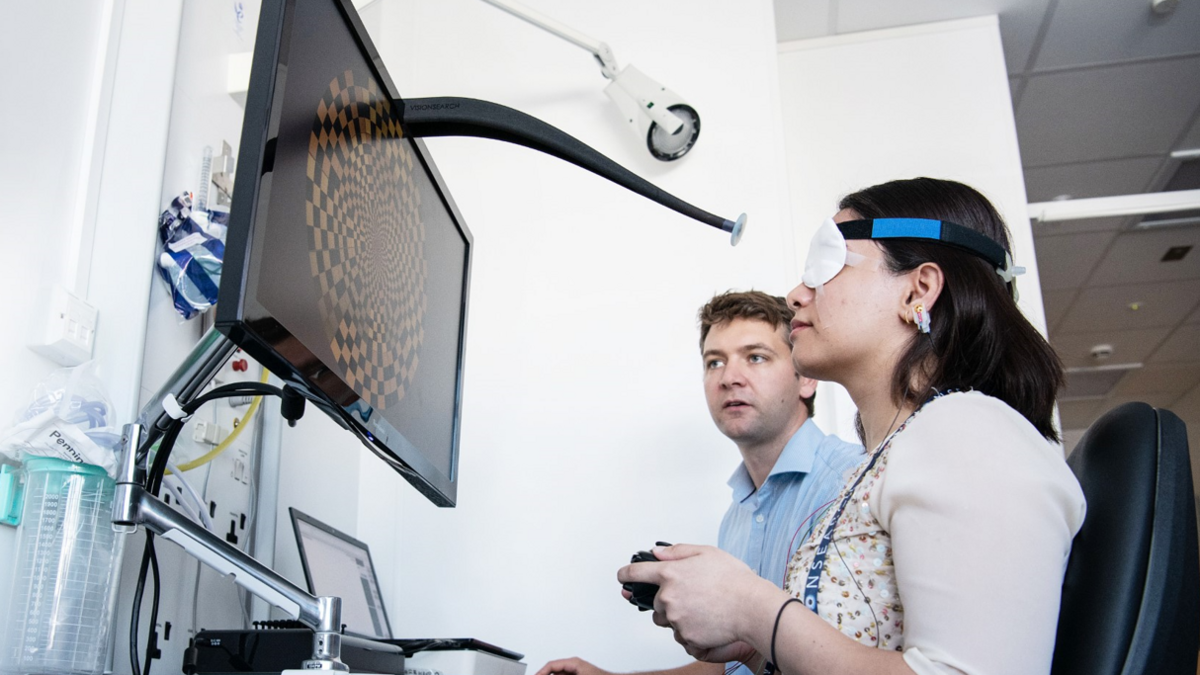MS trial results suggest drugs could repair damage

Dr Nick Cunniffe and his team tested signals between the eye and brain
- Published
Multiple sclerosis (MS) could be "on the brink of a new class of treatment" after early trial results suggest two drugs may repair damage caused by the condition.
A study led by the University of Cambridge looked at whether a diabetes drug and an antihistamine could help repair myelin, which is the protective coating around nerves which gets damaged by MS.
The MS Society said the "truly exciting" early findings could be a step towards halting disease progression, with further work needed on efficacy and safety.
"Within the next decade we could see the first licensed treatment that repairs myelin and improves the lives of people living with MS," said Dr Nick Cunniffe, who led the trial.
"We still need to research the long-term benefits and side effects before people with MS consider taking these drugs.
"But my instinct is that we are on the brink of a new class of treatments to stop MS progression."
MS is a chronic disease in which the body's immune system attacks the myelin sheath which surrounds the fragile nerve fibres in the brain and spinal cord.
When myelin is damaged, it causes symptoms including fatigue, spasms, and problems with walking, balance and bladder function.
According to the MS Society, which funded the research, more than 150,000 people live with the disease in the UK, with 135 diagnosed each week.
Existing disease-modifying therapies only work on one aspect of the condition - the immune system - and do not stop the gradual nerve damage that leads to long-term disability, the charity added.

Annabelle Stigwood said MS had forced her to reassess her physical capabilities
As part of the research, half the trial group was given a course of the drugs and the other half a placebo.
The effectiveness was measured by how quickly signals travelled between the eyes and the brain. These slowed down in the placebo group over the course of six months, and remained constant in the drug group.
Annabelle Stigwood, of Great Dunmow, Essex, was among those who took part.
She was diagnosed with relapsing MS in 2011 and felt the disease was "slowly chipping away" at her.
"I've gone from feeling very hopeless to feeling positive," she said.
"From being told there was nothing they could do about the deterioration, to being part of trial that's saying that's possibly no longer the case - it's incredible.
"If the results are this promising, what else can they do?"

Hannah Threlfall said it would "mean everything" to find a way to stop MS progression
Her thoughts were echoed by Hannah Threlfall, a vicar in Little Abington, near Cambridge, who also took part and said she felt privileged to be involved and "give something back" for her excellent care.
She was diagnosed with MS six years ago and experiences fatigue and balance problems.
"I am so chuffed - the results are so exciting and I do believe a cure will be possible in my lifetime," she said.
Director of research at the MS Society, Dr Emma Gray, said the findings were the culmination of decades of work.
"These results are truly exciting, and could represent a turning point in the way MS is treated," she said.
"We desperately need ways to protect nerves from damage and repair lost myelin, and this research gives us real hope that myelin repair drugs will be part of the armoury of MS treatments."
The drugs would be the subject of further studies before a licensed treatment could be made available, the charity said.
Get in touch
Do you have a story suggestion for the East of England?
Follow East of England news on X, external, Instagram, external and Facebook: BBC Beds, Herts & Bucks, external, BBC Cambridgeshire, external, BBC Essex, external, BBC Norfolk, external, BBC Northamptonshire, external or BBC Suffolk, external.
- Published21 November 2024

- Published22 April 2022
